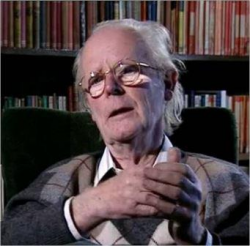John Maynard Smith

Image courtesy of Web of Stories
- Born
- 6 January 1920
- Died
- 19 April 2004 (age 84)
John Maynard Smith is one of the most influential biologists of the 20th century. His most famous work is in the field of evolutionary biology, where he was particularly interested in applying game theory to evolution.
Maynard Smith was born in London, in January 1920, the second son of a wealthy family. His father was a surgeon but died when John was only eight. The family then moved to live with his mother's relatives in Exmoor, where Maynard Smith first developed his fascination with natural history.
As a student, Maynard Smith joined the Communist party and read engineering at Trinity College, Cambridge. When war broke out in 1939 he tried to join the army but was rejected because of his poor eyesight. He later joked that; "under the circumstances, my poor eyesight was a selective advantage—it stopped me getting shot." Instead, he completed his degree and graduated with second class honours in 1941. He worked in the aircraft design factories until the end of the war when he decided that aircraft were "noisy and old fashioned." He decided to return to his first love, biology, and wrote to J B S Haldane, asking for his advice. He was accepted at University College London (UCL) to read zoology and graduated with a first in 1951.
Despite never gaining a PhD, Maynard Smith was offered a position as a lecturer at UCL, a post he held until 1965. While there, he worked mainly in the Drosophila (fruit fly) laboratory, studying population genetics alongside Haldane. He published a popular science book, The Theory of Evolution, in 1958. During this time he began to grow disillusioned with Communism and eventually left the party in 1956.
Maynard Smith left UCL to move to the newly-created University of Sussex, where he set up the School of Biological Science. He was dean for 20 years.
It was in 1973 that he did his most famous work on 'Evolutionary Game Theory. 'Game theory' is a mathematical model of behaviour originally developed in economics to calculate the best strategy an individual can take for the greatest gain in any given situation.
Maynard Smith applied this theory to evolution. When animals share resources in the wild they are in direct competition with each other and each wants to maximise their share of the resources available. Game theory offered an excellent mathematical model for this competition. Maynard Smith's devised the idea of an evolutionarily stable strategy (or ESS), which is the optimal behaviour an animal can adopt in order to pass its genes on to the next generation. It does this by means of a cost/benefit ratio, where the behaviour with the highest benefit compared to the cost of using this method is adopted.
It is an occupational risk of biologists to claim, towards the end of their careers, that the problems which they have not solved are insoluble.
John Maynard Smith, in Games, sex and evolution, 1988.
Maynard Smith officially retired in 1985. He continued working and researching, maintaining an active interest in evolution, until his death in 2004.



